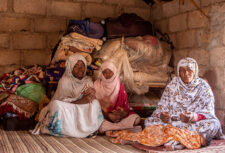Disclaimer: This article is more than 11 years old, and may not include the most up-to-date information or statistics. Please verify information with more recent sources as needed, and if you have any questions contact our Press Office.
15 March 2013
The recent occupation of northern Mali by separatist and Islamist groups left people of slave descent, many of whom are still in slavery, extremely vulnerable, but Anti-Slavery partners Temedt can play a vital role in re-establishing stability.
As the poorest and most marginalized in society, people of slave descent have been badly affected by the lack of trade, resources and services in the region. They have had no means to flee affected areas. While many masters left the region, abandoning slaves, other masters have used the current chaos as an opportunity to reassert their authority over former slaves with impunity. There have been cases where Bellah villages were targeted and children were abducted by their former master. People of slave descent (or ‘Bellah’) were also particularly targeted by Islamist groups for punishments such as amputation, flogging and stoning, as their low social status leaves them particularly defenceless.
Slavery was formally abolished in Mali in the 1960s. However, although slavery is not allowed under the constitution, there is no specific law criminalizing slavery. Descent-based slavery still exists throughout the country, especially in the northern regions. Thousands of people remain the “property” of their masters, either living with them and serving them directly, or living separately but remaining under their control. Other people descended from slaves are no longer under their masters’ control but face severe discrimination on account of their social class.
Anti-Slavery International’s Malian partners Temedt have been campaigning to eradicate slavery in Mali since 2006 and have a unique perspective and expertise on relations in the North.
Temedt can play a leading role in civil society efforts to establish peace, stability and social cohesion in Mali, and ensure that eradicating slavery is a top priority. With its northern representatives Temedt and Anti-Slavery can facilitate the participation of the slave classes in dialogues and decision-making on prospects for the North (including military intervention and political negotiations).
It is important to promote a greater awareness and understanding of the injustice of slavery among people of slave descent and key stakeholders including the government, diplomatic community, media, religious leaders and traditional chiefs, both in the North and in other regions.
With elections approaching, Temedt will undertake a series of initiatives to promote the engagement of people of slave descent: translating human rights and laws on decentralization into local languages and promoting human rights and citizenship issues through local media such as radio, and holding public meetings and debates, as well as artistic meetings and events to raise awareness of the current plight of people in slavery.
It is crucial to develop Temedt’s capacity to reach and respond to people in slavery, to provide after-care to victims escaping slavery and to ensure victims’ safety. This will be done by funding the activities of representatives in the North and in other regions, as they assist and mobilise vulnerable individuals and groups. There will be a particular focus on their capacity to monitor and record information on slavery and other human rights violations.
Temedt and Anti-Slavery are working to increase the self-sufficiency and empowerment of vulnerable people of slave descent, both in the North and in other regions. This is being done by training these groups in human rights, citizenship, education, advocacy training and microcredit as well as providing informal education for children.
The phenomenon of slavery must not be overlooked in international and national efforts to address the crisis in the North. People of slave descent have a voice and access to assistance through Temedt and Anti-Slavery International; their current plight must not be neglected. In efforts to restore stability to the North, the question of slavery must also be taken into account. Sustainable peace is not possible as long as such extreme exploitation, social inequalities and tensions persist.





